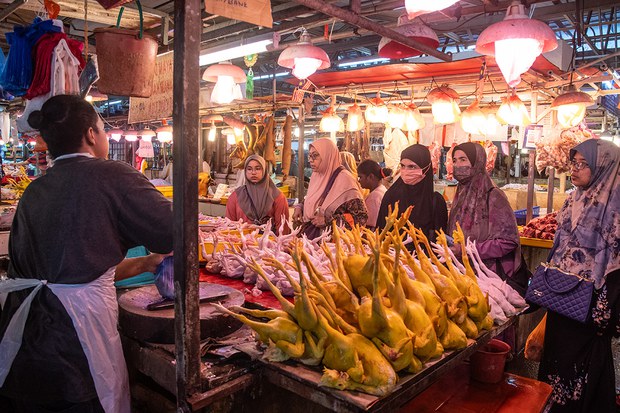The Malaysian government’s plan to remove subsidies this year on food and other basic necessities for all and target them only for needy citizens has many in the low and lower-middle income groups worried.
That’s because food prices have been high since the Ukraine conflict erupted in 2022, and they could further pinch pocketbooks when fuel subsidies are off the table for many, starting in the second half of 2024.
Malaysia subsidizes people’s spending for chicken, eggs, rice, some kinds of cooking oil and electricity, among other things.
Sabri Hasan, a 65-year-old retiree from Kuala Lumpur, faces the brunt of food inflation from two sides – as a buyer of dry noodles and no-longer-subsidized bottled oil from wholesalers, and from customers who eat at the food stall he opened after retiring.
“They complain my serving [size] has become smaller,” he told BenarNews.
“What can I do? Either I increase the price and retain the amount of noodles or retain the price and serve a 25% smaller meal,” he said.
Prime Minister Anwar Ibrahim has defended moving towards targeted subsidies, saying it is a bid to reduce government expenditure and debt and boost revenue.
While presenting the 2024 budget in October, Anwar, who is also finance minister, said that subsidies for chicken and eggs alone had cost 3.8 billion ringgit (U.S. $817.2 million) since February 2022, when Russia invaded Ukraine. Also in October, he said at an event that total subsidies in 2023 were expected to be 81 billion ringgit ($17.4 billion), local media reported.
The government needs to keep the public, especially the middle class, well informed about how the removal of blanket subsidies may affect them.
That’s because the middle class skirts the income-level line, and a sudden increase in food prices could hit its members hard, said Jacob George, president of the Consumer Association of Subang and Shah Alam.
As it is, household debt in Malaysia was the second highest in Southeast Asia, at 1.4 trillion ringgit (U.S $301.1 billion), which is almost equal to the country’s total 1.5 trillion debt. Malaysians cannot afford to take on more debt, Jacob told BenarNews.
“Prices of other consumer goods have been going up while there has been a shortage of supply of subsidized items, including chickens, eggs and sugar this year,” Jacob told BenarNews.
And inflation will go up when blanket subsidies end, especially the petrol and fuel ones starting in the third quarter, said Jacob as well as Ameer Ali Mydin, who owns a prominent retail chain.
“Transport companies may increase their prices which will see prices of other items going up,” Ameer told BenarNews.
Robust government initiatives to protect customers from the rising cost of living were needed, such as cash handouts and an efficient Central Database Hub (Padu), which is a socio economic database of the country’s citizens and households.
Padu was launched on Jan. 2 and ran into problems on day one, with people expressing concern about the security of their personal data.
Some price increases, though, are caused by global supply and demand factors and the value of the ringgit against the U.S. dollar, said Fuziah Salleh, deputy minister for Domestic Trade and Cost of Living.
“The ministry will continuously monitor sudden price hikes through direct surveillance and inspections on premises,” she told BenarNews.
For instance, the enforcement of the Price Control and Anti-Profiteering Act 2011 will be strengthened to regulate excessive profits by traders, she said.
Targeted diesel subsidies will be given to select transport industries to curb transport prices once petrol and diesel subsidies take effect, Fuziah added.
The industries will mostly be from the commercial sector, covering cargo, bottle and beverages, frozen items, prime movers of goods, and water and flour tankers, including vans carrying panels and windows, the minister said.
“They will come under a Fleet Card System,” she said, adding that the diesel subsidy card would be issued to eligible vehicles to prevent leakages, smuggling and illegal sales.
Economist Yeah Kim Ling said the government was moving in the right direction with targeted subsidies but proper planning was crucial.
Middle-class income earners need to be cushioned from any sudden surges in the prices of food and services.
“Or we may see more middle income earners dropping to lower income groups, as food prices are still on the rise due to a global shortage, bad weather and depreciation of the ringgit,” he said.
Food costs that shot up after the Ukraine conflict have stayed high, which means base prices are already high.
Shah Azalina Albert, a 22-year-old nurse in Kuala Lumpur, has been working for almost two years without a salary increase.
“My salary is not keeping pace with the rising prices,” she told BenarNews.
In December, her grocery bill was 30% higher than last January.
She is hoping to work extra hours or find an additional freelancing job.
“But this will come at the expense of my free time and mental health,” she said.
“Not good.”
Reference : https://www.benarnews.org/english/news/malaysian/concern-about-end-blanket-subsidies-01052024155145.html

